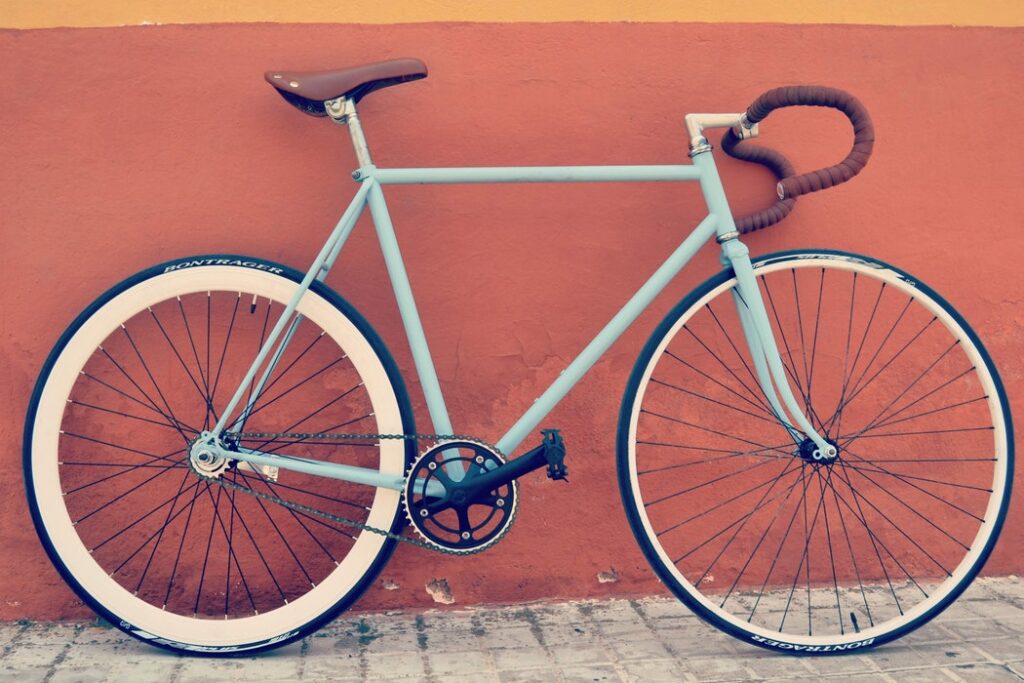While sheltering-in-place we’ve been spending a lot more time baking. And wouldn’t you know: Stressed Spelled Backwards is: Desserts!
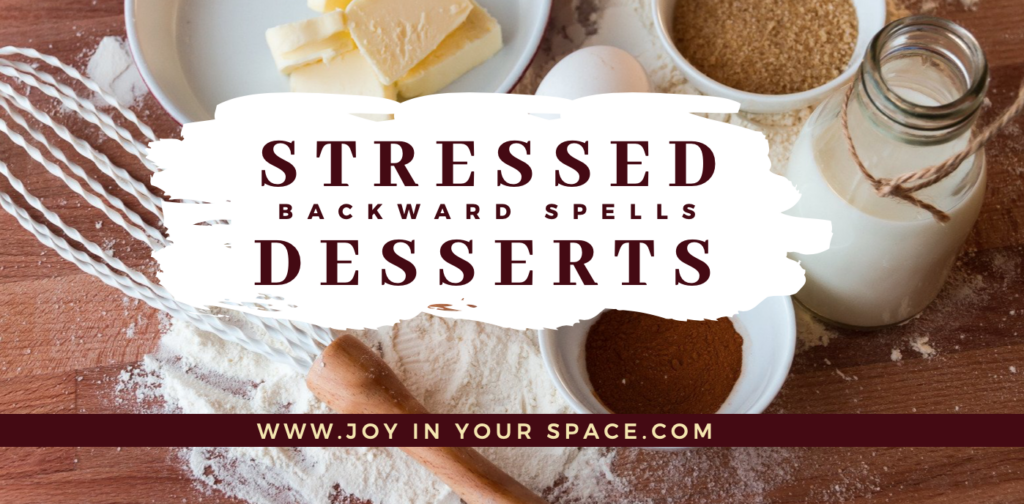
I saw that catchy phrase after delivering my 5th batch of muffins in April. To avoid gaining the dreaded Covid-15 (think Freshman-15) I delivered Tupperwares to my neighbor, who appreciates my zero-sugar recipes.
With my last delivery of cranberry-sweetened pumpkin millet muffins, I wrote “sorry for dumping my stress-baked goodies on your doorstep.” She texted back “TY” with a link to “Stress-baking is a real thing!”
My 3 favorite therapeutic benefits to baking:
This “proof of progress” is where I want to focus.
I don’t know about you, but I am:
• losing a sense of what day it is
• not as productive as I was before Covid-19
• feeling less accomplished despite feeling almost as busy
So I reflected on the tools I used before Covid-19:
Here’s why I’m returning to these habits:
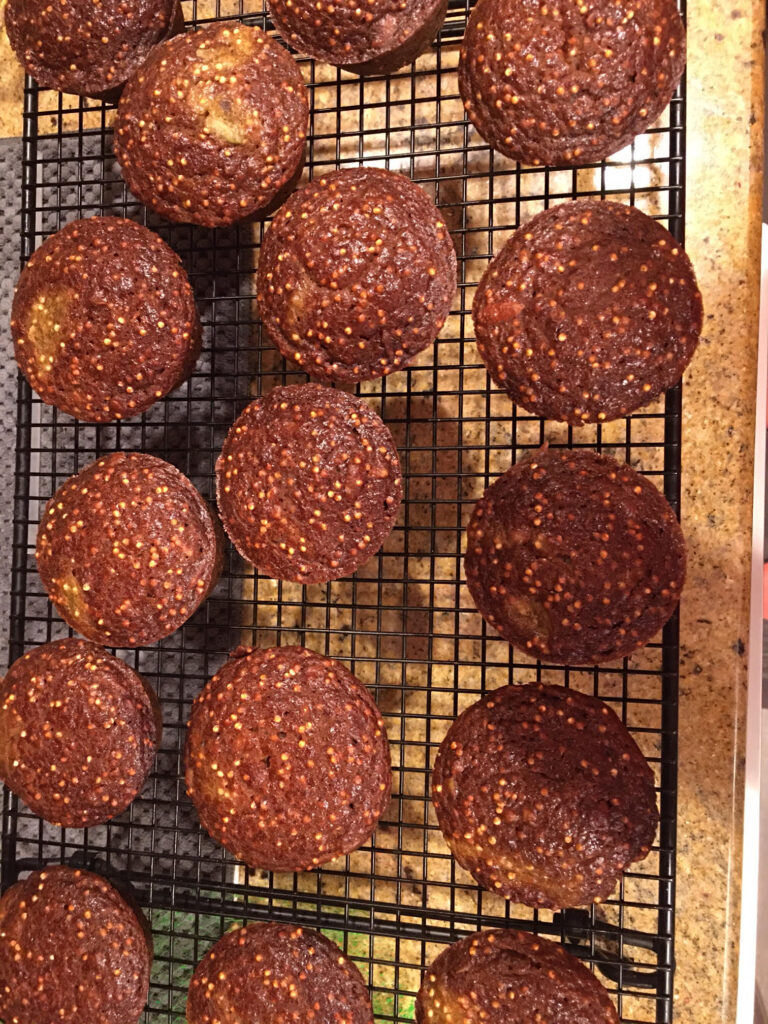
I can’t take credit for figuring out…stressed spelled backwards is desserts!
First and foremost, our thoughts and prayers are with those who have contracted this virus. We wish you a speedy recovery. For the rest of us, we face several weeks of home confinement. I don’t know about you but when I stay home for longer than one day, I tend to become lethargic and unmotivated. This time I’m determined not to let that happen. Here’s my plan of action:
Sentimental objects are one of the most challenging categories for professional organizers to help clients with. This is especially true with objects related to family history, such as:
Photographs,
Newspaper clippings,
Family history documents (letters, journals, diaries, invitations, etc.),
Education related (book reports, college papers, graduation diplomas, etc.),
Civil records about family members (marriage records, immigration records, birth/death certificates, etc.)
Photos, diaries, papers, trophies…these are all critical elements of your family legacy. They tell the story of important family members, and are the fabric of what binds families together. Personally, I am not an advocate of throwing this all away. On the other hand, how can anyone benefit if these materials are stashed away in the attic, basement, or closet?
The first step to any family history project is taking an inventory of what you have. Even if your project is simply tidying your family history boxes, you will be happy you did it. And I promise, your children will thank you!
Take some time to go through each box carefully and understand what is in them. It’s almost always the case we find things we had completely forgotten about. And it’s not at all uncommon to find objects we thought were lost. Once you know what you have, it will be much easier to figure out what to keep, and how to organize it all.
One complaint I hear frequently is that people don’t really know what to do with these materials. They accumulate and accumulate, taking up more room than you ever would have wanted. The fear of the materials being damaged, and frustration that nothing productive is being done with them, causes most people to feel anxious, along with a good measure of guilt.
Organizing family history materials allows us to honor family members and declutter. As I mentioned, I am not a fan of throwing these materials away. BUT, you’ll be surprised how much space is being taken up by duplicates, damaged papers/photos, old frames, and photos of people you don’t know—all of which can all be thrown away.
And watch out for newspaper clippings! Newspaper paper does not last. Not only that, it can damage other materials it comes into contact with.
The advent of online publishing has made printing books in small print runs very affordable. Imagine having a book of all your parents’ correspondence, and giving a copy to each of your children. Or imagine assembling all the civil records about your ancestors so the whole family can have a richer understanding of its roots and history. All you need is a scanner and a little patience. If you don’t have the time, there are many scanning services which can do this for you. The Association of Professional Photo Organizers is also a great place to find someone locally who can do this.
Once scanned, it’s time to select an online book publisher. There are many to choose from. Two of my favorites are Blurb and Mixbook. Mixbook in particular has some great layouts just for family history projects. Be sure to wait for a sale! Both these sites frequently offer significant discounts.
It probably won’t surprise you to learn that these books become instant family heirlooms. They make terrific gifts for important birthdays or around the holidays.
If you run into a hiccup while organizing, scanning, or making your book, feel free to give me a call. I’m always happy to answer questions. Good luck with your family history project!

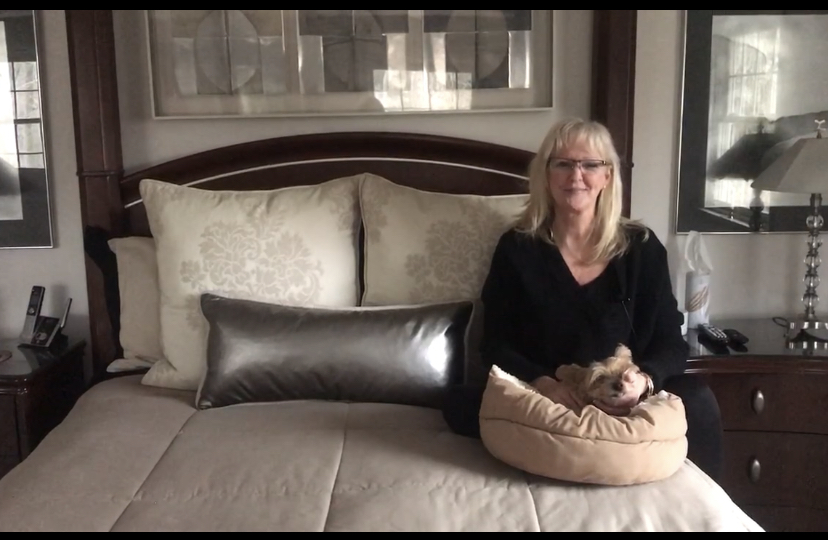
I remember when my mother used to nag me to make my bed. I remember her saying, “you can go when your bed is made.” I would come up with a hundred reasons why it was a pointless task but perhaps there was a method to her motherly madness.
We spend approximately one-third of our lives in our bedrooms. And, it has been proven that the appearance of our bedroom has an overall affect on our mood and our productivity.
Our bed is the most dominant feature in our room. A made bed creates a positive vibe and immediately gives us a feeling of accomplishment. According to the National Sleep Foundation survey, a made bed also contributes to healthier sleep habits and better rest. In addition to increased productivity, bed makers also enjoy lower stress levels, improved moods and tidier homes.
Admiral William McRaven spoke about the transformative power of the daily bed making habit at the University of Texas commencement in 2014. It has since gone viral with over 10 million views and has been referred to by some of the worlds best thought leaders. He states “If you want to make a difference in the world, start by making your bed.” He said in part, “if you make your bed every morning, you will have accomplished the first task of the day. It will give you a small sense of pride and will encourage you to do another task and another and another. By the end of the day, that one task completed will have turned into many tasks completed. Making our bed will also reinforce the fact that little things in life matter.” I just love this: https://www.youtube.com/watch?v=jflUvxQLkgs
Since his commencement speech, Admiral McRaven published Make Your Bed: Little
Things That Can Change Your Life…And Maybe the World , a
#1 New York Times Bestseller.
Thanks mom, I suppose you had a point. Having an organized living space makes all the difference. I make my bed ever morning…and this small task has made the rest of my day feel infinitely more together.
I hope you will agree!
I am the first to admit that I used a Professional Organizing colleague and friend to help me with something I’ve been meaning to do for years. She helped me go through my closets and determine what to keep and what to finally give away.
My reluctance was four-fold:
I finally bit the bullet and hired my friend. It was the best money I’d spent in a while. In four hours, we got through all my clothes closets. I had a ton of clothes and hangers to donate, all of which went to a women’s shelter in Camden, NJ. My closets have room now, I have bunches of hangers I can use for anything new that I buy, I feel free, and I know that these clothes can be used by those not as fortunate as I.
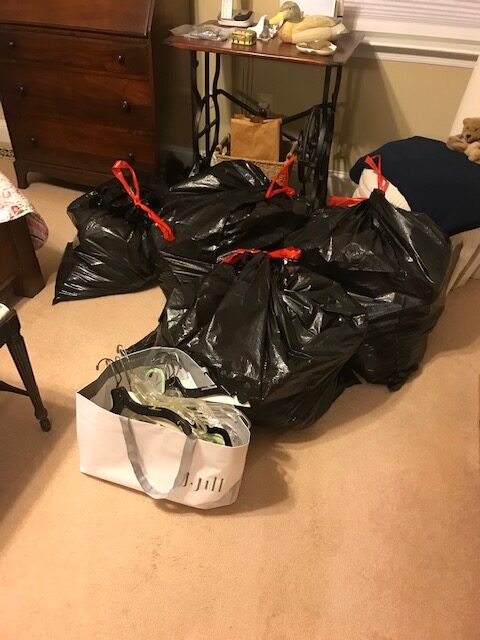
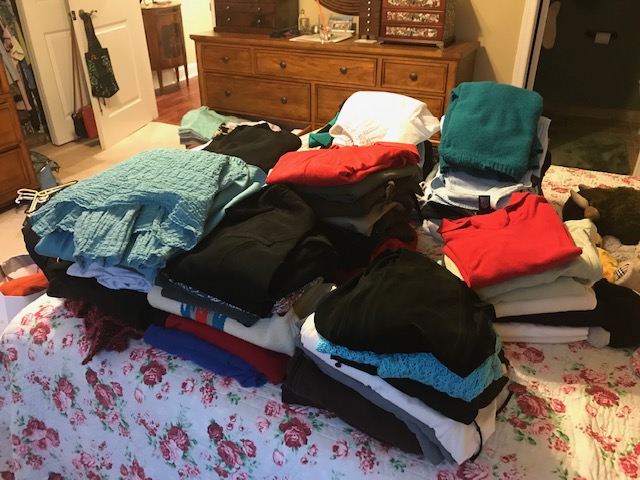
So, what does it say about a Professional Organizer asking for help from a Professional Organizer? Some of you may wonder why I couldn’t do this by myself.
Firstly, I was able to ask for help. There is nothing wrong with asking for help. We all have strengths, and we all face challenges in our lives. Why not ask for help when needed?
Secondly, what I experienced is exactly what my clients experience, and that was worth its weight in gold. I think I’m a pretty empathetic person, but this solidified it for me. I tried on clothes that I wasn’t sure about, and since my colleague was not emotionally invested in anything (but my parents bought that blouse in Greece for me a zillion years ago) and only had my best interest at heart, I was able to let go of mostly everything. I was bound and determined to get through the closets.
Thirdly, I had a stake in the game. The date was set, and I knew that since I was paying for the service, I was very prepared and determined to get through this project in a timely manner. I compared this to having a personal trainer. Once you pay for something, aren’t you more apt to follow through?
The funny thing about this is after the 4 hours, my colleague asked me if I was going to go through any of the clothes and pull things out that I think I may still want to keep. I laughed, said no, and realized I ask the same question to my clients.
Just because you have room for things, like I did, doesn’t mean you have to keep them, especially if you aren’t using them anymore. Perhaps the time is right for you to ask for help with your organizing projects.
Remember that old saying “it’s just like riding a bike”? I have no idea who coined it, but it was meant to draw a comparison to activities that are deeply rooted in the muscle memory gained from lots of practice. The idea is, if you practiced enough, riding your bike becomes like second nature. If you practice enough, you can train your body to ride with a lot less thought or effort. And if that bike sat rusty in the garage for 10 years, because you had put forth the effort to practice years before, you can jump back on and ride away into the sunset as if only mere seconds had passed since your last pedal session.
People ask me a lot about the best ways to stay organized. Cleaning up and out seems to be the easy part, but now that the house is beautiful, and everything is put away in its place, how do we keep it this way? Depending on how far removed your new organizing behavior is from your old habits, staying organized is going to take the same vigor and endurance as it took to learn to ride that bike years ago.
For example, if you always lose your keys around the house, and we implement a new process to hang them on a hook by the door when you enter, you will need to make the conscious effort to actually do it…every time. It takes practice, and more practice, until eventually hanging the keys on the hook becomes second nature and engrained in your muscle memory. Suddenly hanging the keys on the hook will feel like an easy routine, and the process will no longer be a strain on your brain power and intention as you arrive home tired from work each night. The thing to remember is that there will be work involved. I unfortunately can’t wave a magic wand to “cure” us of our poor organizing habits and replace them with ones that work better for our lives. If I could, I would be the first to wave it over my own house!
There are a lot of schools of thought out there around best practices for forming habits and the importance of considering things like learning styles, motivators and goals. Developing new habits to stay organized will take time, support and accountability from family and friends, as well as a focused desire from whoever is embarking on this mission. I have lots of tricks up my sleeve to help move this process along for each client, but the overarching theme to remember is that practice makes perfect. You are going to have to conjure up the focus, intention and willpower to practice, but once mastered, your new habits really will be just like riding a bike!
